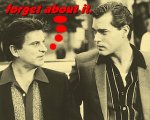B
Beck
Guest
For all the wordage I'm not seeing any technical arguments from digital advocates... only declarations of a religious nature.
I see attacks in the form of propaganda, resembling the 3rd grade level of political ads on TV. But they fall short of enlightening the reader. All we learn in the end is that so and so doesn’t like so and so and thinks he’s full of it.
If one’s goal is just to check in now and then with a lie repeated, well then I suppose you will have some success with newer members.
People that don’t understand the technology aren’t learning anything and people that do have a broad grasp of recording technology in general are bored to death (speaking personally).
In the three years I’ve participated in this particular forum absolutely no one arguing for the superiority of digital recording has actually presented technically sound, logical argumentation. Nothing has been said that I haven’t already heard 20 years ago. The arguments consist mostly of digital myths started and propagated by an industry that has everything riding on the universal acceptance of their wares.
So, I would like to see what people really know.
Putting old grudges and misunderstandings aside… what do you know, and would you care to share it with the forum for the enlightenment and benefit of all those here that share a love of music and recording?
I would like to see a thread that remains civil, while at the same time allowing for each person’s unique and colorful way of communicating.
Show us what you got.
Tim

I see attacks in the form of propaganda, resembling the 3rd grade level of political ads on TV. But they fall short of enlightening the reader. All we learn in the end is that so and so doesn’t like so and so and thinks he’s full of it.
If one’s goal is just to check in now and then with a lie repeated, well then I suppose you will have some success with newer members.
People that don’t understand the technology aren’t learning anything and people that do have a broad grasp of recording technology in general are bored to death (speaking personally).
In the three years I’ve participated in this particular forum absolutely no one arguing for the superiority of digital recording has actually presented technically sound, logical argumentation. Nothing has been said that I haven’t already heard 20 years ago. The arguments consist mostly of digital myths started and propagated by an industry that has everything riding on the universal acceptance of their wares.
So, I would like to see what people really know.
Putting old grudges and misunderstandings aside… what do you know, and would you care to share it with the forum for the enlightenment and benefit of all those here that share a love of music and recording?
I would like to see a thread that remains civil, while at the same time allowing for each person’s unique and colorful way of communicating.
Show us what you got.
Tim

Last edited:







 ).
).